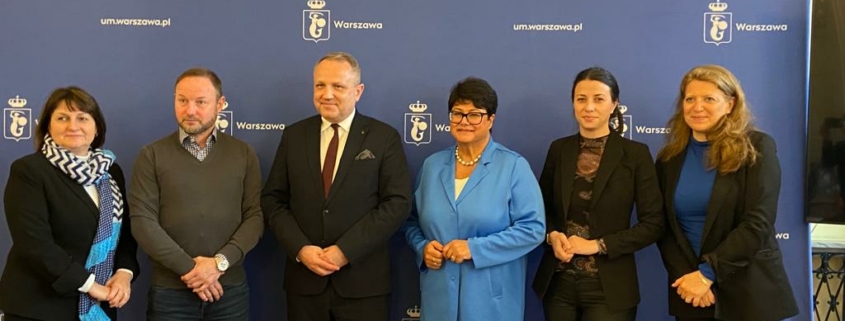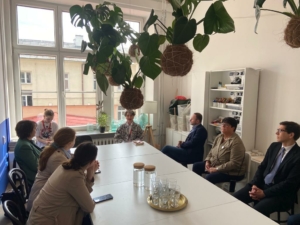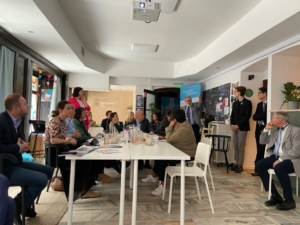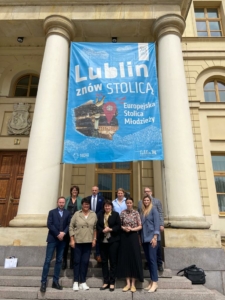As part of a delegation from the European Parliament’s Committee on Culture and Education, Irena MEP Joveva took part in a working mission to Poland from 15 to 17 May 2023, where she learned about the current state of play in the field of media freedom, culture and education. Despite the attempts of the Polish government representatives to present a democratic picture of the country, the MEP considers the situation to be anything but ideal.
Joveva visited Poland to gain a comprehensive understanding of what is happening in the fields of media, culture and education, which are often the main target of attacks by governments with authoritarian tendencies. During the mission, she met with representatives of the Polish government, local communities, media, civil society, academia and representatives of the cultural industry. It is precisely the exchange of firsthand experiences and direct conversations with people and organisations working on the ground on a daily basis that can provide a more accurate insight into what is happening.
“I am sorry to have to say that my fears have come true. While for the representatives of the Polish government ‘everything is in perfect order and entirely democratic’, I can only conclude from all the conversations I have had – especially with the representatives of the Polish government – that the situation in Poland is anything but ‘in perfect order’.”
During the mission, the MEP could see with her own eyes how the Polish government is attacking freedom at all levels – academic freedom, artistic and cultural freedom, and, by constantly suppressing media pluralism in the country, media freedom in particular. Strikingly, government representatives have not attempted to conceal the actions and methods by which they seek to achieve their goals, and this is further proof of the serious backsliding of democracy and the rule of law in Poland since the illiberal Law and Justice party took power.
“The conversations over the last three days have laid bare the fact that in Poland, law and justice are administered exclusively in accordance with the standards of the government led – ironically – by the party which has law and justice in its name.”
Nevertheless, Joveva was adamant that there are many Polish citizens who are active in civil society and believe in fundamental, democratic European values. Unfortunately, the Polish government has not shown any sign of following suit, as for several years it has been tirelessly and systematically dismantling all the foundations of a democratic society, which is supposed to foster independence and provide a system of checks and balances.
“Under the previous government, we also witnessed such attacks in Slovenia, and although much has been corrected under the current government, the effects of those actions are still evident in many places, including on public service television, where, despite final rulings, the current management still refuses to take responsibility and continues to undermine media freedom, using eerily similar rhetoric to their Polish counterparts.”
Everything that the MEP could witness firsthand during the three-day mission confirmed her conviction that overarching European legislation on media freedom is a necessity.
“I hope that the European Media Freedom Act is adopted and then implemented as soon as possible, but in the meantime the EU must resolutely employ all the tools already at its disposal to stop the erosion of the rule of law.”
In Joveva’s opinion, the visit to the country confirmed that all the measures taken so far by the European Union following the actions of the Polish government were justified, including the freezing of EU funds, and she also underlined the need to find a way to directly channel these funds to people and civil society adhering to European values.
You can read the MEP’s press release following her visit to Poland here and the press release by the Head of Delegation in its original (English) version here.
About visits by Committee on Culture and Education delegations
This is a second mission that followed a visit to Hungary between 2 and 4 November 2022, where the Committee’s delegation noted the deterioration of academic freedom, including imposed self-censorship, and problems resulting from the Hungarian government’s pressure and influence on the country’s media, courts, arts and culture. The continued pressure and the decline of freedom in Poland led MEPs to decide to also travel to Poland.







Leave a Reply
Want to join the discussion?Feel free to contribute!